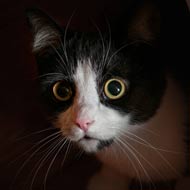'Huge spike' in missing pets, charity reports

The number of dogs and cats reported missing to the charity more than doubled during recent storms.
Recent thunderstorms have resulted in a 'huge spike' in reports of missing pets, according to Battersea Dogs and Cats Home.
During stormy weather this July, a total of 35 dogs and cats were reported missing to the charity's Lost Dogs and Cats line. This is more than double the figure from the previous weekend.
With forecasts indicating more storms on the way this week, Battersea is urging pet owners to take steps to keep their animals safe.
"Loud noises, such as thunder and fireworks, can be very scary to some dogs," said the charity's canine welfare trainer Louise Taylor. "In some cases it can trigger extreme fear and cause distress to the dog and its family."
An eight-year-old border terrier called Jumble bolted in fear during a recent storm and ended up at Battersea's south London centre. Jumble wasn't microchipped, but as luck would have it, his owner called the charity and the pair were reunited.
Many pets are not as fortunate as Jumble, however, spending long periods of time in rescue centres before their owners come forward or they find a new home.
Battersea is once again urging owners to microchip their pets, or if they are already chipped, to check the contact details are up-to-date. Microchipping of all dogs will become compulsory in England from April 2016.
During storms, owners are advised to put on the radio to drown out the sound, give dogs a safe place to hide and ensure windows and doors are securely closed. It is also a legal requirement for dogs to wear a collar and ID tag.
To help dogs overcome their fear in the long term, Battersea also advises a sound CD, played very quietly while owners play with the dog's favourite toy or feed them tasty treats, gradually increasing the noise over time.



 The Veterinary Medicines Directorate (VMD) is inviting applications from veterinary students to attend a one-week extramural studies (EMS) placement in July 2026.
The Veterinary Medicines Directorate (VMD) is inviting applications from veterinary students to attend a one-week extramural studies (EMS) placement in July 2026.